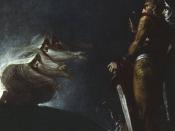People and decisions can greatly affect the outcome of a person's life determining whether the outcome will be successful or disastrous. In the Shakespeare play of Macbeth, there are two factors that contributed to Macbeth's ruin. One of them being more to blame: The influential character of Lady Macbeth displaying temptation towards Macbeth, or Macbeth's own ambitious and insecure nature. There are questions whether Macbeth's downfall might have displayed more for his own blame. In closer examination, it will be come apparent that Macbeth is more to blame for his downfall. By first examining the influential acts of Lady Macbeth that made Macbeth commit the murder to kill Duncan, and contrasting these with the ambitious and insecure nature of Macbeth's character that committed the murderous acts of Banquo and Macduff's family, it will become evident that Macbeth is more to blame.
Downfall is a term where it goes about the highest rank, and then descends drastically time passes by.
Downfall is a cause of sudden ruin. The term blame is a term used to describe the parties fault. What ever caused a problem to a certain event has blame to that existing problem. The term blame means to hold responsibility to one of the opposing side in an event. In the play, Lady Macbeth, his husband, forces Macbeth to kill the King of Scotland. She feels that they should hold the throne. Macbeth does kill Duncan and rises up to power. As he rises, his insecurity and ambition causes him to commit murderous deeds, which eventually brings him down.
Although Macbeth is more to blame for his downfall, Lady Macbeth also contributed to Macbeth's ruin. Lady Macbeth uses temptation and his ambition as tools to do what
-2-
she thinks will bring him success. In the beginning of the play,


